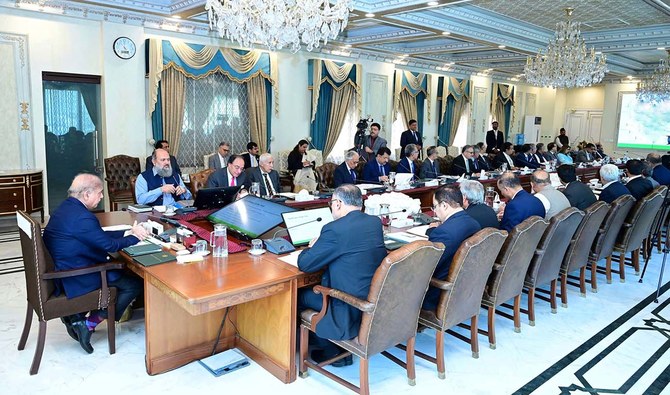KARACHI: World Cup fever hangs heavy in the air when one arrives at Karachi’s busy Light House market, with Team Pakistan jerseys hanging at every shop and eager shopkeepers loudly luring customers to check out their merchandise.
One shop, however, stands out from the rest, and for good reason: outside it stands a mannequin sporting a blue jersey — the Indian cricket team’s jersey.
Pakistan and India’s bitter past of fighting three wars over the last seven decades has breathed life into one of the most intense sports rivalries around the world. A cricket match between the two nations is one of the most watched spectacles in sports and a World Cup contest between the two sides is every broadcaster’s dream.
Emotions will run high for millions in the two cricket-mad countries when Pakistan face India on Saturday, Oct. 14, in front of over 130,000 fans in Ahmedabad. Despite the rivalry, fans in both countries revere each other’s cricket superstars. Pakistan captain Babar Azam has a legion of fans in India, and in Pakistan, Kohli is considered the ultimate cricketing hero.
And that is one reason why dozens of fans arrive at Azeem Sports Shop daily to buy up the Indian cricket team’s jerseys.
“The reason for wearing this shirt and supporting India is Virat Kohli and [Jasprit] Bumrah, whom we admire greatly,” Rehan Shah, who was wearing an Indian jersey, told Arab News. “It’s because of them that we have bought this shirt.”
Former Indian skipper Kohli is considered arguably the best white-ball batter in modern-day cricket and a fierce competitor for Pakistani cricketers. With 77 international hundreds to his credit, he burst onto the international scene in 2008, and after a few years, when the great Sachin Tendulkar retired and MS Dhoni started waning, became India’s next global batting sensation, and a mainstay in the senior men’s team.
In Pakistan, both the Indian team and its players have a huge following. That is why Shah said he would be wearing the Indian cricket team’s jersey when he gathers with his cousins and family members on Saturday to watch the Pakistan-India clash.
And he’s not the only one either.
Noor Ahmed, another cricket fan, said he loved to sport other teams’ jerseys when they were not playing against Pakistan, and often bought jerseys of the cricket teams to whom his favorite players belong.
“In the Australian team, I admire Steven Smith and [Glenn] Maxwell, and in the Indian team, Virat Kohli and Rohit Sharma are my favorite batsmen,” Ahmed, who has bought eight Indian jerseys for himself and his friends, told Arab News.
“On the days of their matches, we will wear their team’s T-shirt … We will support the teams that have our favorite players but during the Pakistan-India match, we will wear Pakistan’s shirt.”
Muhammad Shahid, a salesman at Azeem Sports Shop, said Pakistan team jerseys were currently selling like hot cakes but so were Indian and Australian shirts.
“People come and demand Virat Kohli shirts,” Shahid told Arab News. “They ask for team India’s jersey with Virat Kohli’s name on it.”
Muhammad Azeem, the owner of Azeem Sports Shop, said many Indian team fans came to his store.
“Many fans here support Virat Kohli and Rohit Sharma,” Azeem told Arab News.
“Often, Pakistanis here buy Indian team jerseys and inscribe Virat Kohli’s name on the back.”
















